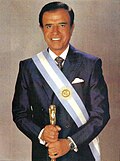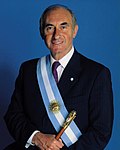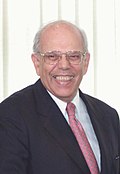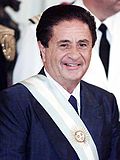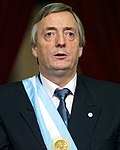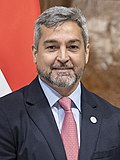| No. | Portrait | President | Took office | Left office | Time in office | Country |
|---|
| 1 | | Carlos Menem
(1930–2021) | 29 November 1991 (1991-11-29) | 1 July 1992 (1992-07-01) | 215 days |  Argentina Argentina |
| 2 | | Fernando Collor
(born 1949) | 1 July 1992 (1992-07-01) | 1 January 1993 (1993-01-01) | 184 days |  Brazil Brazil |
| 3 | | Andrés Rodríguez
(1923–1997) | 1 January 1993 (1993-01-01) | 1 July 1993 (1993-07-01) | 181 days |  Paraguay Paraguay |
| 4 | | Luis Alberto Lacalle
(born 1941) | 1 July 1993 (1993-07-01) | 1 January 1994 (1994-01-01) | 184 days |  Uruguay Uruguay |
| 5 | | Carlos Menem
(1930–2021) | 1 January 1994 (1994-01-01) | 1 July 1994 (1994-07-01) | 181 days |  Argentina Argentina |
| 6 | | Itamar Franco
(1929–2011) | 1 July 1994 (1994-07-01) | 1 January 1995 (1995-01-01) | 184 days |  Brazil Brazil |
| 7 | | Juan Carlos Wasmosy
(born 1938) | 1 January 1995 (1995-01-01) | 1 July 1995 (1995-07-01) | 181 days |  Paraguay Paraguay |
| 8 | | Julio María Sanguinetti
(born 1936) | 1 July 1995 (1995-07-01) | 1 January 1996 (1996-01-01) | 184 days |  Uruguay Uruguay |
| 9 | | Carlos Menem
(1930–2021) | 1 January 1996 (1996-01-01) | 1 July 1996 (1996-07-01) | 182 days |  Argentina Argentina |
| 10 | | Fernando Henrique Cardoso
(born 1931) | 1 July 1996 (1996-07-01) | 1 January 1997 (1997-01-01) | 184 days |  Brazil Brazil |
| 11 | | Juan Carlos Wasmosy
(born 1938) | 1 January 1997 (1997-01-01) | 1 July 1997 (1997-07-01) | 181 days |  Paraguay Paraguay |
| 12 | | Julio María Sanguinetti
(born 1936) | 1 July 1997 (1997-07-01) | 1 January 1998 (1998-01-01) | 184 days |  Uruguay Uruguay |
| 13 | | Carlos Menem
(1930–2021) | 1 January 1998 (1998-01-01) | 1 July 1998 (1998-07-01) | 181 days |  Argentina Argentina |
| 14 | | Fernando Henrique Cardoso
(born 1931) | 1 July 1998 (1998-07-01) | 1 January 1999 (1999-01-01) | 184 days |  Brazil Brazil |
| 15 | | Raúl Cubas Grau
(born 1943) | 1 January 1999 (1999-01-01) | 28 March 1999 (1999-03-28) | 86 days |  Paraguay Paraguay |
| 16 | | Luis González Macchi
(born 1947) | 28 March 1999 (1999-03-28) | 1 July 1999 (1999-07-01) | 95 days |  Paraguay Paraguay |
| 17 | | Julio María Sanguinetti
(born 1936) | 1 July 1999 (1999-07-01) | 1 January 2000 (2000-01-01) | 184 days |  Uruguay Uruguay |
| 18 | | Fernando de la Rúa
(1937–2019) | 1 January 2000 (2000-01-01) | 1 July 2000 (2000-07-01) | 182 days |  Argentina Argentina |
| 19 | | Fernando Henrique Cardoso
(born 1931) | 1 July 2000 (2000-07-01) | 1 January 2001 (2001-01-01) | 184 days |  Brazil Brazil |
| 20 | | Luis González Macchi
(born 1947) | 1 January 2001 (2001-01-01) | 1 July 2001 (2001-07-01) | 181 days |  Paraguay Paraguay |
| 21 | | Jorge Batlle
(1927–2016) | 1 July 2001 (2001-07-01) | 1 January 2002 (2002-01-01) | 184 days |  Uruguay Uruguay |
| 22 | | Eduardo Duhalde
(born 1941) | 1 January 2002 (2002-01-01) | 1 July 2002 (2002-07-01) | 181 days |  Argentina Argentina |
| 23 | | Fernando Henrique Cardoso
(born 1931) | 1 July 2002 (2002-07-01) | 1 January 2003 (2003-01-01) | 184 days |  Brazil Brazil |
| 24 | | Luis González Macchi
(born 1947) | 1 January 2003 (2003-01-01) | 1 July 2003 (2003-07-01) | 181 days |  Paraguay Paraguay |
| 25 | | Jorge Batlle
(1927–2016) | 1 July 2003 (2003-07-01) | 1 January 2004 (2004-01-01) | 184 days |  Uruguay Uruguay |
| 26 | | Néstor Kirchner
(1950–2010) | 1 January 2004 (2004-01-01) | 1 July 2004 (2004-07-01) | 182 days |  Argentina Argentina |
| 27 | | Luiz Inácio Lula da Silva
(born 1945) | 1 July 2004 (2004-07-01) | 1 January 2005 (2005-01-01) | 174 days |  Brazil Brazil |
| 28 | | Nicanor Duarte
(born 1956) | 1 January 2005 (2005-01-01) | 20 June 2005 (2005-06-20) | 170 days |  Paraguay Paraguay |
| 29 | | Tabaré Vázquez
(1940–2020) | 20 June 2005 (2005-06-20) | 9 December 2005 (2005-12-09) | 172 days |  Uruguay Uruguay |
| 30 | | Néstor Kirchner
(1950–2010) | 9 December 2005 (2005-12-09) | 21 July 2006 (2006-07-21) | 224 days |  Argentina Argentina |
| 31 | | Luiz Inácio Lula da Silva
(born 1945) | 21 July 2006 (2006-07-21) | 19 January 2007 (2007-01-19) | 182 days |  Brazil Brazil |
| 32 | | Nicanor Duarte
(born 1956) | 19 January 2007 (2007-01-19) | 29 June 2007 (2007-06-29) | 161 days |  Paraguay Paraguay |
| 33 | | Tabaré Vázquez
(1940–2020) | 29 June 2007 (2007-06-29) | 18 December 2007 (2007-12-18) | 172 days |  Uruguay Uruguay |
| 34 | | Cristina Kirchner
(born 1953) | 18 December 2007 (2007-12-18) | 1 July 2008 (2008-07-01) | 196 days |  Argentina Argentina |
| 35 | | Luiz Inácio Lula da Silva
(born 1945) | 1 July 2008 (2008-07-01) | 16 December 2008 (2008-12-16) | 168 days |  Brazil Brazil |
| 36 | | Fernando Lugo
(born 1951) | 16 December 2008 (2008-12-16) | 24 July 2009 (2009-07-24) | 220 days |  Paraguay Paraguay |
| 37 | | Tabaré Vázquez
(1940–2020) | 24 July 2009 (2009-07-24) | 8 December 2009 (2009-12-08) | 137 days |  Uruguay Uruguay |
| 38 | | Cristina Kirchner
(born 1953) | 8 December 2009 (2009-12-08) | 3 August 2010 (2010-08-03) | 238 days |  Argentina Argentina |
| 39 | | Luiz Inácio Lula da Silva
(born 1945) | 3 August 2010 (2010-08-03) | 17 December 2010 (2010-12-17) | 136 days |  Brazil Brazil |
| 40 | | Fernando Lugo
(born 1951) | 17 December 2010 (2010-12-17) | 29 June 2011 (2011-06-29) | 194 days |  Paraguay Paraguay |
| 41 | | José Mujica
(1935–2025) | 29 June 2011 (2011-06-29) | 20 December 2011 (2011-12-20) | 174 days |  Uruguay Uruguay |
| 42 | | Cristina Kirchner
(born 1953) | 20 December 2011 (2011-12-20) | 29 June 2012 (2012-06-29) | 192 days |  Argentina Argentina |
| 43 | | Dilma Rousseff
(born 1947) | 29 June 2012 (2012-06-29) | 7 December 2012 (2012-12-07) | 161 days |  Brazil Brazil |
| 44 | | José Mujica
(1935–2025) | 7 December 2012 (2012-12-07) | 12 July 2013 (2013-07-12) | 217 days |  Uruguay Uruguay |
| 45 | | Nicolás Maduro
(born 1962) | 12 July 2013 (2013-07-12) | 29 July 2014 (2014-07-29) | 1 year, 17 days |  Venezuela Venezuela |
| 46 | | Cristina Kirchner
(born 1953) | 29 July 2014 (2014-07-29) | 17 December 2014 (2014-12-17) | 141 days |  Argentina Argentina |
| 47 | | Dilma Rousseff
(born 1947) | 17 December 2014 (2014-12-17) | 17 July 2015 (2015-07-17) | 212 days |  Brazil Brazil |
| 48 | | Horacio Cartes
(born 1956) | 17 July 2015 (2015-07-17) | 21 December 2015 (2015-12-21) | 157 days |  Paraguay Paraguay |
| 49 | | Tabaré Vázquez
(1940–2020) | 21 December 2015 (2015-12-21) | 29 July 2016 (2016-07-29) | 221 days |  Uruguay Uruguay |
| – | | Joint presidency [b]
Acting | 13 September 2016 (2016-09-13) | 14 December 2016 (2016-12-14) | 92 days |  Argentina Argentina
 Brazil Brazil
 Paraguay Paraguay
 Uruguay Uruguay |
| 50 | | Mauricio Macri
(born 1959) | 14 December 2016 (2016-12-14) | 21 July 2017 (2017-07-21) | 219 days |  Argentina Argentina |
| 51 | | Michel Temer
(born 1940) | 21 July 2017 (2017-07-21) | 21 December 2017 (2017-12-21) | 153 days |  Brazil Brazil |
| 52 | | Horacio Cartes
(born 1956) | 21 December 2017 (2017-12-21) | 18 June 2018 (2018-06-18) | 179 days |  Paraguay Paraguay |
| 53 | | Tabaré Vázquez
(1940–2020) | 18 June 2018 (2018-06-18) | 18 December 2018 (2018-12-18) | 183 days |  Uruguay Uruguay |
| 54 | | Mauricio Macri
(born 1959) | 18 December 2018 (2018-12-18) | 17 July 2019 (2019-07-17) | 211 days |  Argentina Argentina |
| 55 | | Jair Bolsonaro
(born 1955) | 17 July 2019 (2019-07-17) | 5 December 2019 (2019-12-05) | 141 days |  Brazil Brazil |
| 56 | | Mario Abdo Benítez
(born 1971) | 5 December 2019 (2019-12-05) | 2 July 2020 (2020-07-02) | 210 days |  Paraguay Paraguay |
| 57 | | Luis Lacalle Pou
(born 1973) | 2 July 2020 (2020-07-02) | 16 December 2020 (2020-12-16) | 167 days |  Uruguay Uruguay |
| 58 | | Alberto Fernández
(born 1959) | 16 December 2020 (2020-12-16) | 8 July 2021 (2021-07-08) | 204 days |  Argentina Argentina |
| 59 | | Jair Bolsonaro
(born 1955) | 8 July 2021 (2021-07-08) | 17 December 2021 (2021-12-17) | 162 days |  Brazil Brazil |
| 60 | | Mario Abdo Benítez
(born 1971) | 17 December 2021 (2021-12-17) | 21 July 2022 (2022-07-21) | 216 days |  Paraguay Paraguay |
| 61 | | Luis Lacalle Pou
(born 1973) | 21 July 2022 (2022-07-21) | 6 December 2022 (2022-12-06) | 138 days |  Uruguay Uruguay |
| 62 | | Alberto Fernández
(born 1959) | 6 December 2022 (2022-12-06) | 4 July 2023 (2023-07-04) | 210 days |  Argentina Argentina |
| 63 | | Luiz Inácio Lula da Silva
(born 1945) | 4 July 2023 (2023-07-04) | 7 December 2023 (2023-12-07) | 156 days |  Brazil Brazil |
| 64 | | Santiago Peña
(born 1978) | 7 December 2023 (2023-12-07) | 8 July 2024 (2024-07-08) | 214 days |  Paraguay Paraguay |
| 65 | | Luis Lacalle Pou
(born 1973) | 8 July 2024 (2024-07-08) | 6 December 2024 (2024-12-06) | 151 days |  Uruguay Uruguay |
| 66 | | Javier Milei
(born 1970) | 6 December 2024 (2024-12-06) | 3 July 2025 (2025-07-03) | 209 days |  Argentina Argentina |
| 67 | | Luiz Inácio Lula da Silva
(born 1945) | 3 July 2025 (2025-07-03) | 20 December 2025 (2025-12-20) | 170 days |  Brazil Brazil |
| 68 | | Santiago Peña
(born 1978) | 20 December 2025 (2025-12-20) | Incumbent | 36 days |  Paraguay Paraguay |


